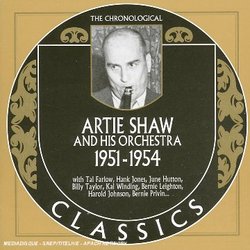| All Artists: Artie Shaw & His Orchestra Title: 1951-1954 Members Wishing: 0 Total Copies: 0 Label: Classics France Original Release Date: 1/1/2006 Re-Release Date: 3/21/2006 Genres: Jazz, Pop, Classical Style: Swing Jazz Number of Discs: 1 SwapaCD Credits: 1 UPC: 3448967141324 |
Search - Artie Shaw & His Orchestra :: 1951-1954
 | Artie Shaw & His Orchestra 1951-1954 Genres: Jazz, Pop, Classical
|
Larger Image |
CD Details |
CD ReviewsArtie Shaw 1951-1954: Too Long in the Making William Davis | 06/20/2006 (5 out of 5 stars) "This compact disc contains material that has not been released commercially in large part in many years. Some of the material covered by this and the preceding CLASSICS Records disc (Artie Shaw and his Orchestra, 1950 / Classics volume 1397) has been available recently only on the two-band Tommy Dorsey / Artie Shaw CD on the Swingsation label (Universal / GRP # GRD 9953) and before that only on the two-record 33-1/3 LP set released in 1975 on the MCA label (The Best of Artie Shaw, MCA2-4081.) It is too long in the making. Unfortunately, the first seven, and the last six tracks are either entirely forgettable (the first block) or else have been covered elsewhere (the last two tracks on the well-known MusicMasters set actually produced by Shaw himself in recent years.) This is extremely excusable because of the centerpiece of the disc. There are eight songs on this disc, comprising tracks 8 through 15 that make the disc well worth the price alone. These eight tracks are magnificent recordings of two slightly different orchestras (and were done only days apart) that in many ways are reminiscent of ALL of Shaw's earlier bands. All eight tracks include not only the conventional "big band" instrumentation but also a full string section, and are worth listening to again and again not only for what they contain in and of themselves, but also for hints at earlier arrangements of those tunes performed previously by any of Shaw's bands. Track 8 (These Foolish Things) was recently provided on NPR's website and commented upon by Shaw himself as containing the most perfect cadenza he could imagine. Track 9 (In the Still of the Night) was covered on the aforementioned MCA2-4081 and was thus familiar to this listener but is highly worth listening to, for its combination of classical and what we might loosely think of as "big band" elements. Of the other tracks, Track 11 (I'll Be Seeing You) is notable not only for Billy Butterfield's excellent lead trumpet (reminiscent of 1940 all over again) but also for Shaw's brief but masterful solo work; Track 12 (It Could Happen to You) is played very straight, but is in many ways mindful of that same 1940 organization; Tracks 13, 14 and 15 are notable for many things but again contain elements of previous arrangements. These songs, as the liner notes indicate, are "of the time" in that highly swinging music was "out" -- but the liner notes are in error in saying that Shaw himself could not have been pleased. The aforementioned NPR interview clearly disproves this theory. In point of fact, these songs are all very reminiscent of the first 1940 experimental sets with strings (those that produced Frenesi and most of which have not been available for many years.) One notable difference is the advancement of Shaw's playing, and his interpretation. Those jazz fans who own the Musicmasters sets and who have longed for similar playing by Shaw in a big band/orchestra format will be especially pleased here. For any fan of the music of this era, these tracks will be enjoyable. For those who actively collect and analyze Shaw's music (as I have done for over twenty years) these are a must-have set. -Will Davis" The Great Artie Shaw Randall Riley | Austin, TX | 11/01/2008 (4 out of 5 stars) "Shaw is, without a doubt, my favorite Big Band clarinet player. I agree with all that William Davis wrote EXCEPT his assertion that there was nothing redeeming about the first seven tracks. To that, I should point out that tracks six and seven are more than worth a listen. First, at the time this disc was released, they were unavailable on CD. Second, this was the ONLY time outside of the early to mid-1930's that Artie Shaw and the equally great jazz vocalist Connee Boswell recorded together. Those tracks, "Where There's Smoke, There's Fire," and "My Little Nest of Heavenly Blue," just happened to turn out Shaw's last charted single (Nest), hitting #25 spot on Billboard's charts on 11/22/52. (Source: Joel Whitburn's "Pop Memories, 1890-1954")
" |

 Track Listings (21) - Disc #1
Track Listings (21) - Disc #1